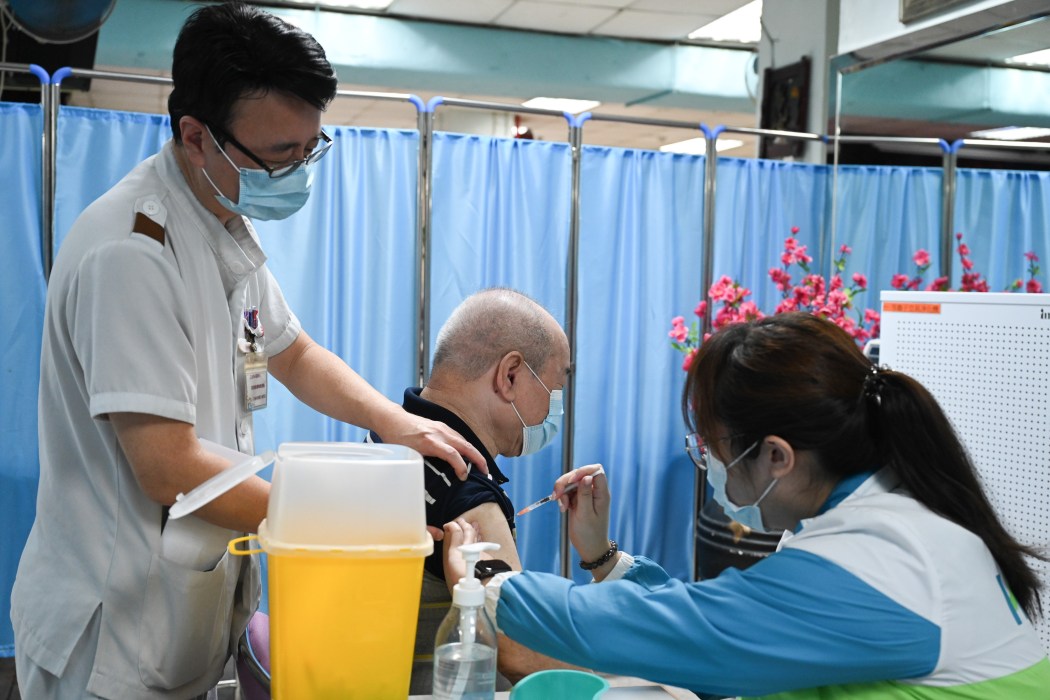When the central authorities chose former police officer and security chief John Lee to be Hong Kong’s fifth chief executive, they signalled the overriding importance of security in Hong Kong.
Lee has not disappointed them.

As secretary for security under Carrie Lam’s leadership, he was part of a government that relentlessly pursued those it perceived to have led and participated in the 2019 anti-government protests.
By mid-2022, authorities had arrested over 200 people for national security violations – roughly one every 3.7 days since the legislation was enacted by Beijing in June 2020. The government prosecutes, and courts convict and jail protesters. By one estimate Hong Kong has over 1,000 political prisoners.
On security – the central authorities’ number one priority – Lee delivered and continues to do so. Never mind that authorities have not held to account the previous government for its role in the 2019 protests.
Central authorities also appointed Lo Chung-mau to lead the health portfolio. Lo, previously head of the HKU-Shenzhen Hospital, understands the mainland Chinese public health system from the inside. Under his leadership the hospital thrived, achieving both international and national recognition for excellence.
Lo came to his position in government with a deep understanding of mainland Covid-19 policy, its strengths and weaknesses, and Hong Kong’s room to manoeuvre. Authorities appointed him precisely because of this understanding. From Beijing’s perspective, in his public statements and actions so far, Lo has not disappointed. Lo reminds us that whatever we do in Hong Kong, we must not bring Covid to the mainland.
For the central authorities, managing security and Covid are the two overwhelming near-term priorities for Hong Kong. Of course, the Chinese Communist Party needs to manage these without crashing the economy, a tall order under China’s strict zero-Covid regime.
From the outset of Covid, Hong Kong has managed the virus differently from the mainland. We had a choice of vaccines, leaders who served as vaccine role models, no universal testing, no weeks- or months-long lockdowns, and – perhaps to our discredit – uneven enforcement of Covid controls.
Since 1997, but especially since 2003, central authorities have watched with growing alarm as Hong Kong failed to manage a Beijing-approved political reform project. Especially under central government pick, former chief executive Carrie Lam, their trust in the local authorities collapsed.
This trend mirrored the declining trust of the people of Hong Kong in their government, which plunged to new lows in 2019 as local authorities mismanaged their extradition bill initiative.
Eager to see the back of Lam, the people of Hong Kong gave Lee a chance. He came to office with a higher popularity rating, 53.8, than Lam when she left, 36.0. Still, Lee came to office with the lowest initial rating of all previous chief executives, tied with Leung Chun-ying.

The level of trust matters, as we have seen in Hong Kong’s Covid fight. A distrusting public refused vaccination with disastrous consequences starting in January 2022. Those aged 20 to 29 were initially particularly vaccine hesitant, in part because of their distrust of the Hong Kong government. The government apparently agreed and, in February 2022, police arrested young vaccine critics, charging them with sedition.
Among the elderly, distrust also played a critical role, focused on distrust of the vaccine itself which many perceived as new, untried, experimental, rushed for emergency use only, and not fully tested for a virus still not well understood. Distrusting family members counselled caution. Care home operators and doctors followed suit. The elderly turned their backs on the vaccine in high numbers.
Political distrust and distrust of the unknown both likely played a role, contributing to Hong Kong’s near collapsed public health system and astronomical death rate at the peak of our Covid fifth wave.

The Hong Kong government needs the trust of the public to implement policy, especially in the priority areas of security and Covid mitigation. Under Lee, public satisfaction with government and trust in government are both inching up. They are, however, still very low.
Lee and Lo have apparently won the trust of the central government. Accordingly, Beijing has provided them space to adopt more pragmatic Covid management policies in Hong Kong, especially for international arrivals.
In this, the central government is experimenting with Hong Kong, opening this one Chinese city first. This also serves China’s wider interest of restoring the economy. Central authorities recognise that, especially in a semi-decoupled world, Hong Kong has value as an international financial centre, attractor of foreign direct investment, and providing a platform for the eventual internationalisation of the renminbi.
Trust works both ways and our leaders need the trust of both the central government and of the people of Hong Kong.
Support HKFP | Policies & Ethics | Error/typo? | Contact Us | Newsletter | Transparency & Annual Report | Apps
Help safeguard press freedom & keep HKFP free for all readers by supporting our team
| HKFP is an impartial platform & does not necessarily share the views of opinion writers or advertisers. HKFP presents a diversity of views & regularly invites figures across the political spectrum to write for us. Press freedom is guaranteed under the Basic Law, security law, Bill of Rights and Chinese constitution. Opinion pieces aim to point out errors or defects in the government, law or policies, or aim to suggest ideas or alterations via legal means without an intention of hatred, discontent or hostility against the authorities or other communities. |

More HKFP OPINION:
HKFP has an impartial stance, transparent funding, and balanced coverage guided by an Ethics Code and Corrections Policy.
Support press freedom & help us surpass 1,000 monthly Patrons: 100% independent, governed by an ethics code & not-for-profit.










